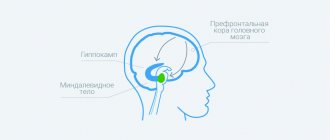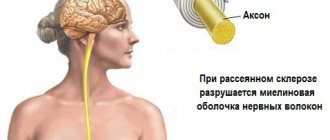The problem of sanity - insanity
The legislation does not provide for a definition of the concept of sanity. Only insanity is revealed. However, it is stipulated that only a person who has reached a certain age, has a certain level of mental and psychological maturity, is aware of the commission of certain actions and leads them, is able to control his behavior, demonstrate consciousness and will, is responsible before the law. Only if these signs are present can we talk about the sanity of a citizen.
What is insanity?
Insanity is a purely criminal category, but has a connection with medical implications.
A person who, due to his morbid mental state, cannot realize the danger and illegality of his criminal act is recognized as insane. It has long been recognized that it is impossible to evaluate the actions of sane and insane people in the same way. Mental illnesses and developmental disabilities prevent people from being fully aware of their actions and being aware of what they are doing.
The Criminal Code of the Russian Federation itself and, in particular, Article 21 “Insanity” do not contain a definition of the concept of insanity.
Until the insanity of the criminal is proven, he will be considered sane.
What does insane mean? Based on the criteria of insanity, it is recognized as a legal entity who, at the time of committing a criminal act, has mental disorders or general somatic diseases that affect behavior and consciousness.
Concept of insanity
but there are people who can escape punishment for their crimes.
Insanity is a painful state of mental activity in which a person cannot correctly assess and manage his actions and actions, and be aware of their consequences (Article 21 of the Criminal Code of the Russian Federation). Such a person will not be held criminally liable. The state of insanity relates exclusively to the period of commission of the crime, that is, it is limited in time. Loss of understanding of the danger of actions, the inability to evaluate and manage them is most often found in mentally ill people.
A doctor or a forensic psychiatric expert has the right to assess a person’s mental state and establish a formula for insanity as a result of a series of special diagnostic techniques. Declaring a person accused of a crime insane is the exclusive prerogative of the court. A person who is insane when committing a crime is released from liability and placed in a psychiatric hospital for treatment (Article 21 of the Criminal Code of the Russian Federation).
Age-related insanity
This concept is absent in the Criminal Code of the Russian Federation . At the same time, in Art. 20 of the Criminal Code of the Russian Federation specifies categories of persons against whom criminal liability for crimes committed cannot be applied.
Thus, children under 16 years of age are exempt from criminal liability for some crimes. From 14 to 16 years of age, punishment is allowed only for certain types of crimes: murder, terrorism, robbery, rape and other grave and especially grave crimes.
If there is a delay in mental development, even having reached the age required to be held accountable for a crime, a person may be released from it. To do this, it is necessary to prove the fact that the criminal was not aware of his actions.
Medical criterion
It includes:
- Chronic mental disorder (schizophrenia, epilepsy, affective psychoses, chronic delusional psychoses) is characterized by a painful mental disorder and a change in attitude towards the world around us, when disorders of consciousness, memory, thinking, affect, behavior, and critical abilities are expressed.
- Temporary mental disorder. It is understood as a wide range of painful psychotic disorders from reversible mental disorders, for example, reactive psychosis, to short-term disturbances of consciousness (exceptional states - twilight, drowsy states, etc.). They are short-lived and often end in recovery.
- Dementia (severe mental retardation and various types of acquired dementia). These conditions must be chronic and progressive and must be characterized by impaired orientation, memory, understanding, learning ability, and a disorder of critical abilities.
- Another painful condition is personality disorders, infantilism and others.
How to admit it?
Insanity is established as follows. If one of your loved ones or acquaintances becomes dangerous to you and others due to mental illness, you can declare him insane (incompetent) in court .
You need to apply to the court at your place of residence. The statement shall set out in detail all the circumstances that illustrate that a person has a mental illness due to which he is unable to control his actions.
Attach any available medical documents: certificates, extracts. Identify witnesses who could tell about the person's inappropriate behavior. Urgently ask to schedule a forensic psychiatric examination.
A sample application for declaring a person incompetent can be downloaded here.
Legal criterion
Characterized by a lack of understanding of the nature of one’s actions (inactions) and possible consequences, as well as the inability to manage them. The legal criterion includes two components:
1. Intellectual is characterized by a person’s awareness of his actions, a full understanding of the situation and the motives of his own behavior, that is, it is the ability to understand the nature of his actions and be aware of their consequences.
Often, having committed an offense, the criminal is sincerely perplexed as to why they are trying to punish him. For example, a citizen stole a bicycle from a bicycle parking lot or from the entrance of a residential building in order, according to him, to ride it and return it.
2. The volitional component means the individual’s ability to direct his actions.
The volitional criterion is greatly impaired, for example, in people dependent on alcohol, drug addicts, and kleptomaniacs. They seem to understand that they are doing wrong, but they cannot do anything about their desires.
Insanity is a mandatory coincidence of both criteria. Otherwise, it is impossible to deprive a person of his sane status.
The concept of sanity in criminal law
Sanity is a mandatory sign of a subject, because crimes are conscious acts of behavior committed under the control of consciousness and will. A person whose mental activity is not impaired and who is capable of realizing the actual nature and social danger of his actions (inactions) and managing them is recognized as sane. And the essence, meaning, purpose of the punishment measures taken can only be correctly perceived by mentally competent people.
Thus, sanity is a mental state of a person, which consists in his ability to account for his actions, control his behavior during the commission of a crime and, in connection with this, bear criminal responsibility and punishment.
Disorders that do not preclude sanity
There are often cases of bringing to justice persons with a mental illness that does not exclude sanity (limited sanity). In such situations, Article 22 of the Criminal Code of the Russian Federation is applied. This legal norm has been used in Russian legislation since 1997. In essence, it is identical to the category of diminished responsibility used in the criminal law of a number of foreign countries.
The introduction of this article provided an opportunity to more accurately determine the mental state of a possible criminal at the time of the crime. This category of persons is assigned a forensic psychological and psychiatric examination, during which an assessment is made of the medical criterion (the presence of a mental illness in the person being examined), which includes a wide variety of mental disorders and behavioral deviations. This criterion contains two positions - sanity and the inability to fully understand and control one’s actions and foresee their consequences.
Such persons are recognized as sane and capable of answering before the court for their actions, but unable to fully understand and control their actions and foresee their possible consequences. That is, a person is sane, he understands what is happening and what he is doing, but he has a mental illness (for example, a personality disorder) that does not allow him to fully control his actions.
Thus, the court will take into account the presence of a mental illness in a person and, if necessary, may recommend that he be observed and treated by a psychiatrist in the place where he will be sent to undergo punishment.
Forensic psychiatry, sanity, insanity, and types of diseases
For the work of forensic psychiatry, determining the insanity or sanity of persons and the classification of their conditions is the main area and the main issue. As a result of this work, actions are classified that cause criminal and civil proceedings to be initiated, lawsuits are filed, controversial situations arise, or public discussions and considerations of certain situations occur.
According to the tradition of the Russian forensic psychiatric school that exists today, our specialists consider the problems of this area from the point of view of determinism. This means that different aspects of human behavior are considered as dependent on the phenomena and influences that exist in society and the world around the individual. Persons who have committed unlawful acts are tested for sanity, which is very important, on the one hand, for a humanistic attitude towards a person.
The question is being considered whether a person’s actions and reactions are the result of the influence that was exerted on him. The scientific-materialistic understanding of mental activity dictates to us that we need to find out what motives influenced the commission of actions, the type of behavior and its specific details. This is the question of sanity and insanity.
History of the development of Russian psychiatric research in the field of insanity
Those ideas and conceptual tools that are used today in Russian forensic and extrajudicial psychiatry have developed over the past centuries through the efforts of Russian science. A central place in the work of our scientists and specialists in this field is the consideration of the spheres of free will, volitional orientation, freedom to dispose of oneself, to choose an activity and actions, from a certain point of view - from the point of view of a materialistic understanding of mental activity.
The so-called “doctrine of insanity” or the field of work in the field of considering the causes of committed actions, through the prism of a materialistic deterministic interpretation of mental activity, largely owes its development and efficiency to such Russian specialists as V.P. Serbsky, S.S. Korsakov, V. X. Kandinsky.
These scientists, as a result of their work, created and presented a picture of what sanity and insanity look like when we consider the human will from a deterministic materialist point of view. And they showed exactly what and how the clinical pictures of diseases in the field of the psyche and the principles of the concepts of sanity and insanity can be correlated with each other.
Now, according to this extensive work, and other trends in Russian science and law, mental sanity appears among one of the prerequisites for guilt. That is, if he himself is responsible for his actions and mental states. The Russian Criminal Code has provisions according to which liability (criminal) can only be assigned to a person who can be called “sane”.
According to the current provisions of the Criminal Code, if a person who has committed illegal actions is not recognized as sane, then his actions are classified as the activity (SOD, socially dangerous actions) of a mentally ill person. And only measures of a medical nature can be applied to such a person, that is, measures of treatment or prevention of illegal actions. Accordingly, in the work to protect the rule of law, the issue of insanity and sanity is very, very important today.
At the same time, in relation to persons who are recognized as insane, medical and therapeutic methods of influence can, in accordance with the law, be applied forcibly. Russian legislation also describes those measures that may be applicable to insane citizens - they are partly regulated.
The formulation of insanity in the Criminal Code, scientific attitudes and views on this issue
Article 21 of the Criminal Code of the Russian Federation specifies the formula for insanity. This completely reads as follows: “a person who, at the time of committing a socially dangerous act, was in a state of insanity, that is, could not realize the actual nature and social danger of his actions (inaction) or direct them due to a chronic mental disorder, temporary mental disorder, is not subject to criminal liability , dementia or “other painful mental state.” In the new interpretation, compared to the formulation of 1960, the cause of insanity is no longer indicated as “mental illness”, but as “mental disorder”.
How is insanity justified from the scientific point of view of modern scientists and forensic psychiatry? According to the scientific formulation, painful disorders occur when the brain stops its normal reflective activity. Normal reflective activity is normal reflection, that is, an adequate reaction of the brain (psyche, nervous system, consciousness) to events in the outside world. The ability of the brain to reflect events in the external world is considered as mental activity from the point of view of psychology. Even I.M. Sechenov wrote about this: “mental activity is reflexive, or reflective activity.”
I.P. Pavlov considered the establishment of conditioned reflexes and reactions to certain events in the brain as a phenomenon that was both mental and physical in nature. Along with innate reflexes, which are called unconditional (that is, independent of current life conditions), there are also conditioned reflexes. They are formed in us according to the environment in which we find ourselves and the influences we experience.
Reflection by the brain of phenomena of the external world is a conditioned reflex activity, which in relation to the unconditioned reflex activity is the highest nervous activity and it can be influenced by influencing factors that can distort the normal reflex process and cause incorrect reflections of various phenomena by the consciousness and nervous system. This is called an “inadequate state.”
In cases where, as a result of exposure to and consumption of incorrect information, the reflective activity of the brain is disrupted, conditioned reflexes that are unnatural for a normal psyche arise. The psyche and nervous system begin to react inadequately to the events of the surrounding world.
Sometimes, as a result of the introduction of incorrect information and inadequate influence on the psyche, when an unnatural environment is created around a person in which information is actively distorted, his mechanism of normal reflection of reality is first disrupted, and then new inadequate conditioned reflexes may begin to form. A distortion in the reflection of reality can be formed for various other reasons. A distorted perception of reality is first formed and then consolidated. This is the essence of painful mental disorders.
In the process of developing mental disorders of various types, consciousness inadequately reflects objectively existing reality and does not recognize it, giving out its own subjective reflection and perception of reality. Also, a person with disorders is not able to correctly evaluate and interpret their own actions. And he is not able to consciously, according to the principles of rationalism and others, regulate his behavior. Depending on the disorder, this inability to objective self-esteem and objective self-regulation may affect different levels of behavior and different actions.
Different types of mental disorders and their classification
Different types of mental disorders and illnesses produce different effects, in which different specific impairments are observed. In each case, these are various violations of the reflection of reality, the objective world. In different cases, disturbances occur in different mechanisms, mechanisms of sensory perception, the mechanism of thinking - the highest form of mental reflection, in the mechanisms of physical perception of the world and a person’s sense of self.
From the point of view of forensic psychiatry, which, according to the type of activity of the ANO “Forensic Expert”, is the main topic of our article, the very important role of mental disorders and violations of adequate reflection of reality is that they lead to the commission of illegal actions. More specifically, from a procedural and scientific point of view, we can say this: they lead to violations and losses of social adaptation, and to the so-called OOD - socially dangerous acts.
In the structure of the definition of insanity and sanity under the Russian Criminal Code and in Russian psychiatry, including judicial psychiatry, when considering different types and degrees of mental disorders, there are different classifications. And two criteria by which, according to the formula of insanity, mental disorders are considered and the actions of their “owners” are further classified. One of them is medical.
A generalizing division of mental disorders into groups in the formula of insanity of Russian forensic psychiatry - according to medical criteria:
- chronic mental disorder;
- temporary mental disorder;
- dementia;
- other painful mental state.
Next, let's look at the groups of mental illnesses in more detail:
- chronic mental disorder. Progressive paralysis, presenile psychosis, senile dementia, schizophrenia, and other mental illnesses that occur continuously or in attacks. These disorders cause persistent or persistent personality changes and tend to progress;
- temporary mental disorder is a disorder that ends with the patient’s recovery. Paranoid, hallucinosis, delirium – alcoholic psychoses. As well as reactive psychoses and exceptional states;
- dementia: etiologically different cases of damage to the intellect - criticism, thinking and memory - as a result of a persistent decrease in mental activity. May cause impossibility or impairment of social adjustment and irreversible personality changes;
- other painful mental state. This group includes disorders and effects that are not strictly scientifically mental disorders, but in which disorders related to higher nervous and mental activity appear. For example, deaf-muteness - in some cases, mental cases of infantilism, some cases of psychopathy.
These classifications during the work of the investigation and experts in determining insanity may be partly conditional. There they do not play a major role, coming into their own only when it becomes necessary to choose measures to influence a patient who has already been declared insane. And scientifically, these definitions are not definitive, since, for example, a “chronic mental disorder” is not necessarily incurable. And many disorders can “walk” between the items on this list depending on the manifestation of various properties and parameters in them.
Here we will end the topic for now, answering the title of our article, and will continue the conversation about forensic psychiatry in other publications. We will talk in particular about the process and subtleties of assessing sanity and insanity. Of course, when reading this material, especially among non-specialists, the question may and should already arise - well, how do we still define and differentiate between sanity and insanity?
V. X. Kandinsky wrote: “Hardly anyone can say that anger, passion, irritation are abnormal states for a person.” And he further concluded that those mental disorders that can be classified as “non-painful” do not exclude sanity. This makes it possible to adequately consider many cases, with the correct classification of the causes of behavior and actions. Based on such a wealth of scientific and practical approaches, and trying not to complicate the consideration of situations, the specialists of the ANO “Forensic Expert” work in particular.
An organization that, throughout Russia and the CIS countries, today, already having extensive experience, can provide you with professional, independent and legally competent assistance in conducting psychiatric forensic and extrajudicial research, creating opinions, reviewing the work of other experts, institutions and organizations. In protecting rights and proving facts. Contact our specialists for this.
Juvenile offenders
In recent years, the number of minors committing crimes has increased. For example, a 15-year-old child committed an offense. A forensic psychological and psychiatric examination was carried out, which established that he did not suffer from a mental disorder. However, the child is developmentally delayed, which is not associated with mental illness.
In such cases, the person is not held accountable because he could not fully appreciate his actions and their consequences. Especially often, mental retardation is associated not only with previous severe somatic or infectious diseases, biological characteristics of the child’s maturation (hereditary, genetic predisposition, pathology of the endocrine system, etc.), but also with social factors (unfavorable living and upbringing conditions, psychologically traumatic family conditions) . Such children have not yet developed volitional functions and the ability to critically assess the current situation. A mental test is also applied to them, where attention is primarily paid to the presence of mental illnesses and features of personality formation.
Thus, the criteria for mental retardation may be:
- low intellectual level;
- mental immaturity;
- social immaturity;
- antisocial behavior;
- difficult character;
- maximalism of desires;
- desire for self-affirmation;
- infantilism and others.
Let's give an example: A 15-year-old teenager is accused of committing theft by a group of people. An examination was carried out, a mental test, after which it became clear that he could not fully understand the nature of the actions he was performing, since after a head injury suffered in childhood, he began to lag significantly in development, showed an infantile character, loved to watch cartoons, communicated with children, younger than yourself in age. His psychological development corresponded to a child of ten or eleven years old. As a result of these reasons, the court declared the accused insane by age.
Signs and criteria
Signs of insanity consist of the following criteria:
- Medical or biological criterion of insanity (a person suffers from some form of mental disorder).
- Psychological (a person is not aware of his actions and their consequences and cannot control them).
Insanity is characterized by the following biological criteria :
- Epilepsy, schizophrenia, schizotypal disorders, etc. (these illnesses are chronic, they often progress and are practically not treated).
- Moronism, idiocy, imbecility - in one word we call dementia. Such diseases can be congenital or acquired as a result of injury or infection. The mental abilities of such people are underdeveloped, the level of intelligence is very low.
Pathological intoxication and fever are mental disorders that go away over time (pathological intoxication differs from ordinary alcoholic intoxication in that alcohol affects a person when he is in a state of deep depression and anxiety, i.e. the combination of these factors often leads to the commission of crimes , which the criminal is not able to explain, because he usually does not act this way).
There are other forms of mental disorders caused by drug use and alcohol abuse (withdrawal, psychopathy, hysteria). Explanations about them will be given below.
Let us only note that in such disorders, recognition of insanity is resolved by judges in different ways, taking into account various circumstances.
The medical (biological) criteria for insanity do not include the following :
- A person is unable to realize the real nature and possible danger of his actions or inaction (intellectual component). Let's look at an example: a schizophrenic mother stabbed a child with a knife - it seemed to her that she was playing with him. There is a known case when a mother, hugging and kissing a child , strangled him, and then sincerely could not understand why he stopped breathing. In both cases, women have a mental illness (schizophrenia), i.e. biological criterion and the intellectual component of the psychological criterion of insanity. They will not be sent to prison, but will be recognized as not being aware of their actions and will be sent to compulsory treatment.
- The person is weak-willed, he is unable to control his actions (volitional component). The volitional component is almost completely destroyed in drug addicts and epileptics. They seem to be aware of what their actions will lead to, but they cannot bring themselves not to do them. They are weak-willed.
The same can be said about kleptomaniacs, pyromaniacs, in a word, everyone who has a morbid passion for doing something. It seems to him that he will die if he does not perform a certain action. Such persons are also often declared insane.
Thus, in order to recognize a person as insane, a combination of a biological criterion and one of the components of a psychological one is necessary.
Let's sum it up
- Insanity is a condition that frees a person from all types of responsibility. It serves as the basis for sending the defendant for treatment.
- The state of insanity is based on two criteria: medical and biological.
- Limited sanity means that a person is sane, but at the time of committing the offense had a disease that prevents the person being examined from fully understanding and controlling his actions.
- The presence of a mental retardation that is not associated with a mental illness may be a reason for exemption from liability before the law and the court.
- Sanity and insanity are legal concepts, therefore a person can only be declared insane in court.
- The conclusion of a forensic psychiatric examination is advisory in nature, and the court makes a decision at its own discretion.
Understanding the full responsibility to society, the judiciary assigns this status with extreme caution and based on the results of thorough research, so as not to exempt criminals who pretend to be mentally ill from responsibility.
Limited Sanity
Often, even if the defendant has mental health problems, he is declared sane or partially sane.
In this state, he is actually aware of his actions, but due to internal motivations beyond his control, he cannot act otherwise.
Limited sanity is a softened version of insanity, a borderline state between absolute sanity and insanity.
In this case, criminal liability will occur, but limited sanity will serve as a mitigating circumstance for her.
So, limited sanity is possible in the following mental states:
- Alcoholism and drug addiction;
- Various degrees of neuroses and depression;
- Personality disorders, paranoia.
Responsibility of sane and insane persons
For a person to be declared insane, he must meet both criteria at once. But you shouldn’t think that such a citizen simply gets away with a crime. If a person has committed a harmful, dangerous act while in an insane state, compulsory medical mental treatment measures must be applied to him.
And important about sanity and insanity in criminal law. A sane citizen will be held accountable in any case! Even if, due to some mental disorder, he could not fully realize the actual nature of his own actions (inaction) and assess the social danger of this. These words need clarification and the disclosure of one more concept.
Committing a crime while intoxicated
On average, about 30% of crimes in Russia are committed in a similar state - alcohol and drugs. They are regulated by Art. 23 of the Criminal Code of the Russian Federation. The article says that a person under the influence of drugs or alcohol cannot be considered insane. He retains full responsibility.
And this is the conclusion on sanity and insanity in criminal law. Ordinary physiological intoxication (we do not take pathological intoxication into account) can somehow disrupt psychological activity and influence actions and decisions. But no matter how strong it is, intoxication does not fall within the scope of insanity. It only narrows the influence of will and intellect on the behavior of the criminal. Therefore, he will be fully criminally responsible.
Now you know the difference between sanity and insanity. And also aware of the criteria for establishing the fact of the latter.
Court hearing
Such proceedings take place in two or three sessions.
At the first, preliminary hearing, you explain the circumstances described in the attached application. It should be understood that the judge first of all wants to personally see the person declared incompetent. The court has the legal right to visit this person if circumstances do not allow him to appear at the hearing. Next, a decision is made to conduct an examination. This judicial act comes into force in fifteen days. Then the matter goes to the experts.
In most cases, experts notify the applicant about the time and place of the commission. As an exception, an examination can be carried out on the basis of provided medical documents, for example, if a person simply cannot get out of bed. But for this, even before the trial, it will be necessary to conduct an examination by a psychiatrist and therapist to confirm and write a conclusion that the citizen does not have the ability to move. All copies of the conclusions are attached to the application.
Signs of insanity
There are three states of the human psyche that characterize varying degrees of adequacy: sanity (absence of pathologies of consciousness and its altered states), insanity (violation of the person’s sphere of awareness and the ability to adequately perceive reality, as well as the processes of thinking), limited sanity (in the presence of a diagnosed disorder of the mental sphere , in which the ability to perceive and analyze is not completely lost, i.e. a person is able to evaluate most of his behavior adequately and only some points or details may indicate minor deviations in the assessment). Based on the results of the diagnosis of the medical commission and the identification of the degree of mental disorders, a punishment is selected, its mitigation or replacement with compulsory treatment.
To determine insanity, a certain procedure has been developed, based on determining the signs of insanity. It is worth noting that a state close to insanity or potentially dangerous behavior are not considered in this context and can only be a recommendation for relatives to be more careful. But as long as there is no perfect action in which the state of insanity will be confirmed by a medical commission and will be combined with a violation considered as such according to legal norms, we can only talk about mental disorders.
The causes of insanity may be within the framework of medical indicators, biologically determined (disorders of mental processes), and also have psychological characteristics (inability to understand one’s actions).
Determining insanity is a task not only of the trial and the medical commission (usually this happens after the action has been committed), but is also a necessary requirement for society. This need is due, first of all, to the fact that knowing the signs of insane behavior, it is possible to provide timely assistance and prevent sad consequences. Cases when they tried to come to an agreement with a person in a state of lost consciousness and appealed to logic had disastrous consequences, since a person in such a state does not hear either arguments or the voice of reason, and delaying the call of a psychiatric team contributed to the commission of a crime. Also, people who are unable to assess the degree of sanity of their opponents often themselves become victims of clouded consciousness or a state of passion in which it is quite difficult to stop a person (a characteristic state for a psychotic exacerbation is an increase in physical strength and speed, a decrease in sensitivity to the words of others and not noticing pain - in this state, without knowing the signs of insanity, you can harm a person and suffer from his actions).
The first sign of insane behavior is a lack of awareness of the destructive and threatening consequences of one’s own actions for oneself and society. This includes examples such as lighting a pioneer fire in the middle of a nine-story apartment, laying out pebbles on rails, feeding a baby raw minced meat, and the like. By carrying out these actions, a person may not take into account the negative consequences, believing that he is not doing anything wrong or even doing something useful.
The second sign is a person’s inability to control his own actions. This includes affective outbursts, after which a person does not remember what happened for a certain period of time, as well as exacerbations of psychopathic diseases. With manic-depressive psychosis, a person may be unable to control his own excitement, go somewhere, run; with paranoid disorder, he may attack people who have some sign that is frightening for him, due to schizophrenia, he may throw a child out of a window on orders votes. There is no need to talk about any control in such cases; in case of mental disorders, the volitional sphere suffers, and in case of affective outbursts (which are a temporary state of insanity and arise as a result of severe emotional shock), memory may also suffer. The only difference is that with a psychiatric diagnosis, the time required to normalize the psyche is quite long and appropriate treatment is necessary, while the affect goes away on its own and drug therapy can only be supportive along with psychotherapy aimed at obtaining ways to regulate and prevent such outbursts. Characteristic of alcoholic delirium, drug-induced impairment of consciousness and psychotic exacerbation - amenable to treatment and full recovery.
The third sign is a complete lack of understanding of one’s own actions and their nature. Obvious negative actions that have no basis in fact - throwing people off a platform onto subway tracks, breaking all the pencils in a box during math class, pouring arsenic into soup. The actions are characterized by a painful, chronic and irreversible mental disorder.
The reasons for insanity in this case may lie in the area of intellectual disability, with stable dementia, an increasing chronic personality defect, the progression of a psychiatric disease - it is practically impossible to treat, a disability group is issued, or a conclusion is issued on lifelong hospitalization, since the person is incapable of independent existence.
Sanity and guilt: the difference
We see that both guilt and sanity are associated with the volitional, intellectual sphere of activity of the subject. Let's look at their key differences:
- Guilt is the (psychological) attitude of the criminal towards his own crime.
- Sanity is the state of mind of the attacker at the time of his crime.
- Guilt is a certain work of the psyche, will, consciousness to evaluate one’s own act, predict its consequences, guide one’s own behavior and achieve socially dangerous results.
- Sanity is a prerequisite, without which the above would not be possible. Hence, only a sane person can be guilty.
It's time to move on to the second concept.








